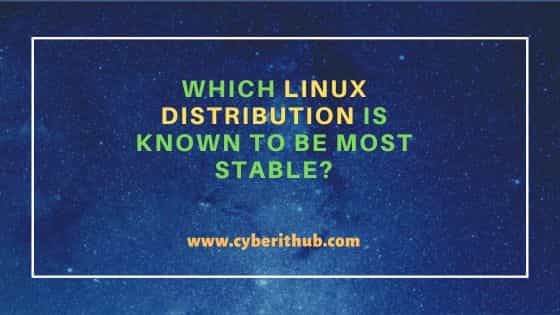Table of Contents
Stability is one of the major parameters that users look before choosing a linux distribution for their critical tasks and operations. Determining the "most stable" Linux distribution can be subjective and often depends on the specific use case and personal preference. However, in general terms, some Linux distributions are widely recognized for their stability, particularly those used in server environments and by users who prioritize system reliability over cutting-edge features. Among these, Debian is often cited as one of the most stable distributions.

Debian - A time tested stable linux distribution
- Reputation for Stability: Debian has a longstanding reputation for being stable. This stability is a result of its thorough testing process and conservative approach to software updates.
- Release Cycle: Debian has a slower release cycle compared to other distributions. This means that updates are less frequent, but when they are released, they have been rigorously tested in multiple stages (unstable, testing, stable).
- Package Management: Debian's package management system (APT with .deb packages) is known for its robustness and reliability, reducing the likelihood of package conflicts and broken dependencies.
- Community and Philosophy: The Debian community and its guiding philosophy prioritize system stability and free software. This focus has contributed to a robust and reliable operating system.
- Widespread Use in Servers: Debian’s stability makes it a popular choice for servers where uptime and reliability are critical.
Brief History of Debian
Debian was founded in August 1993 by Ian Murdock, then a student at Purdue University. He named the distribution "Debian" as a portmanteau of his own name and that of his then-girlfriend, Debra. Murdock announced the creation of Debian with the Debian Manifesto, which outlined his vision for a truly open and collaboratively developed Linux distribution. The first version of Debian (0.01) was released in September 1993, followed by version 0.91 in 1994, which was the first to include the Debian Package Manager (dpkg).
One of Debian's key innovations was the development of the Advanced Package Tool (APT), introduced in 1998. APT revolutionized package handling on Linux, making it easier to install, update, and remove software. Debian releases are named after characters from the film "Toy Story," as a tribute to Bruce Perens, who worked at Pixar and was a key early Debian developer. In 1998, the Debian Constitution was established, formalizing Debian's organizational structure and decision-making processes. Debian is known for its Social Contract and Debian Free Software Guidelines (DFSG), which formalize its commitment to free software principles.
Other Notable Mentions
- CentOS (and its successor, Rocky Linux/AlmaLinux): Known for its stability, being a downstream distribution of Red Hat Enterprise Linux (RHEL). It inherits RHEL's thorough testing and certification processes.
- Ubuntu LTS (Long Term Support) Versions: These releases are supported for five years and are known for their stability. They are a popular choice for both desktop and server environments.
- openSUSE Leap: This distribution is closely aligned with SUSE Linux Enterprise, ensuring a high level of stability and reliability, suitable for professional and enterprise use.
Factors Contributing to Stability
- Release Cycle and Testing: Distributions with longer release cycles typically have more extensive testing, leading to higher stability.
- Community and Corporate Backing: Distributions backed by a strong community or corporation often have better support and more rigorous testing processes.
- Legacy and Track Record: Distributions with a long history tend to be more stable due to accumulated experience and a more mature development process.
- Continued Releases: Debian continues to release new versions, each improving and updating the system while maintaining its core principles of stability and free software.
- Expanding Architecture Support: Over the years, Debian has expanded to support a wide range of hardware architectures, making it one of the most versatile distributions.
Conclusion
While Debian is often lauded for its stability, the "best" choice can vary based on specific needs like hardware compatibility, software requirements, and user expertise. For desktop users who prefer more up-to-date software, a distribution like Ubuntu LTS might be more suitable, while Debian remains a top choice for those who prioritize a rock-solid stable environment, particularly in server setups.
